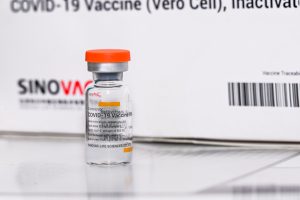Thailand has announced that it will stop using the Sinovac COVID-19 vaccine when its current stocks run out, having used the shot for several months in combination with Western-developed vaccines.
The Chinese-made vaccine has been the key to Thailand’s nationwide vaccination campaign so far, with the country having administered more than 31.5 million Sinovac doses, just under half of its 64.4 million total. In February, the country began administering Sinovac shots to frontline workers, high-risk groups, and residents of the island of Phuket, which was opened in July to international tourists in a special pilot program.
“We expect to have distributed all Sinovac doses this week,” said health official Opas Karnkawinpong, according to Reuters. Opas added that the program will switch to combining the AstraZeneca vaccine, which Thailand is producing locally, with the mRNA vaccines being made by Pfizer and BioNTech.
The announcement comes amid questions about the efficacy of Sinovac’s CoronaVac vaccine, the world’s most widely used COVID-19 vaccine. In July, Thailand became the first nation in the world to begin mixing COVID-19 vaccines, offering people who had received two jabs of Sinovac an additional booster shot of AstraZeneca. This followed the revelation that hundreds of medical workers caught the coronavirus despite being fully vaccinated with Sinovac.
Last month, Thailand’s Siriraj Institute of Clinical Research found that Thailand’s main vaccine regime – a Sinovac shot followed by an AstraZeneca vaccine – generated a lower immune response than a two-dose regime of Pfizer’s mRNA vaccine. Thailand’s heavy reliance on Sinovac has also elicited public pushback, with many members of the public harboring prejudices, well founded and otherwise, against the Chinese vaccine. (While Sinovac’s efficacy is lower than other available vaccines, research shows that it still offers robust protection against serious illness and death.)
The announcement comes as Thailand’s vaccination is finally beginning to gather momentum. Since its launch in February, it has attracted criticism for its sluggish pace and the lack of transparency over the local production deal signed between AstraZeneca and Siam Bioscience, a firm owned by the king with no experience in vaccine production.
The country has now vaccinated around 36 percent of its population, the fifth-most in the Association of Southeast Asian Nations (ASEAN), and has administered at least one dose to 53 percent. Next year, Thailand plans to buy 120 million COVID-19 doses of vaccine and has already booked 60 million doses of AstraZeneca from Siam Bioscience. It hopes to full vaccine 70 percent of the population by the end of the year.
At the same time, while Thailand’s current surge of COVID-19 has now passed its August peak, the country is still recording around 10,000 cases per day, prolonging one of the most serious economic downturns in Southeast Asia. Thailand’s economy is expected to grow just 0.7 percent this year after a 6.1 percent contraction last year, the central bank forecast recently, with the country’s vitally important tourism sector still in the doldrums.
In order to address these issues, Thailand yesterday approved a further 92 billion baht ($2.76 billion) of relief measures to help boost the flagging economy. The country is also forging ahead with a quarantine-free reopening plan that will see 17 provinces opened to vaccinated arrivals from low-risk countries from November 1.

































